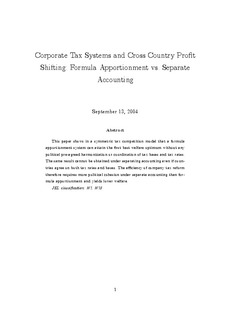| dc.contributor.author | Schjelderup, Guttorm | |
| dc.contributor.author | Eggert, Wolfgang | |
| dc.date.accessioned | 2006-08-03T06:56:19Z | |
| dc.date.available | 2006-08-03T06:56:19Z | |
| dc.date.issued | 2004-09 | |
| dc.identifier.issn | 0804-6824 | |
| dc.identifier.uri | http://hdl.handle.net/11250/162876 | |
| dc.description.abstract | This paper shows in a symmetric tax competition model that a formula
apportionment system can attain the first best welfare optimum without any
political pre-agreed harmonization or coordination of tax bases and tax rates.
The same result cannot be obtained under separating accounting even if countries
agree on both tax rates and bases. The efficiency of company tax reform
therefore requires more political cohesion under separate accounting than formula
apportionment and yields lower welfare. | en |
| dc.format.extent | 178925 bytes | |
| dc.format.mimetype | application/pdf | |
| dc.language.iso | eng | en |
| dc.publisher | Norwegian School of Economics and Business Administration. Department of Economics | en |
| dc.relation.ispartofseries | Discussion paper | en |
| dc.relation.ispartofseries | 2004:24 | en |
| dc.title | Corporate tax systems and cross country profit shifting : formula apportionment vs. separate accounting | en |
| dc.type | Working paper | en |
